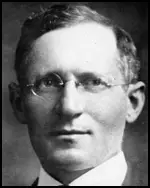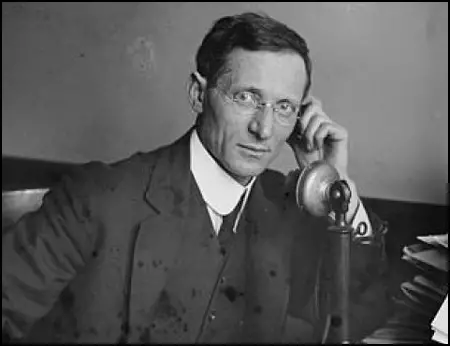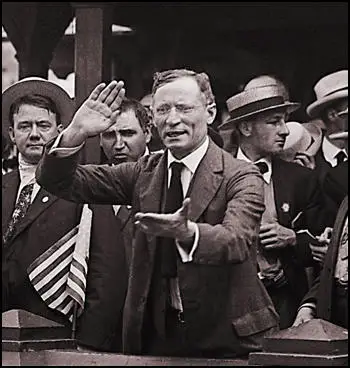Meyer London

Meyer London, the son of Efraim London, a grain merchant, was born in Kalvarija, Lithuania on 29th December, 1871. His father emigrated to the United States in 1888 but it was not until 1891 that the rest of the family joined him in New York City. The family lived in the city's largely Jewish Lower East Side.
London found work as a librarian and a part-time tutor. He also joined the Socialist Labor Party (SLP) that had been established by Daniel De Leon, Laurence Gronlund, Morris Hillquit and Abraham Cahan in 1891. De Leon wrote the SLP's first program that included the breakup of the state, workers' democracy, the seizure of social power by the organized producers and the socialist reorganization of the economy.
In 1896 he stood as a SLP candidate for New York State Assembly. The following year, under the influence of Eugene Debs, he joined the Social Democratic Party (SDP). During this period he attended evening classes at the law school of New York University and was admitted to the New York City Bar Association in 1898. Over the next few years he concentrated on defending the rights of tenants against landlords in the city.
In 1901 the Social Democratic Party (SDP) merged with Socialist Labor Party to form the Socialist Party of America (SPA). Leading figures in this party included Eugene Debs, Victor Berger, Ella Reeve Bloor, Emil Seidel, Daniel De Leon, Philip Randolph, Chandler Owen, William Z. Foster, Abraham Cahan, Sidney Hillman, Morris Hillquit, John Spargo, Walter Reuther, Bill Haywood, Margaret Sanger, Florence Kelley, Rose Pastor Stokes, Mary White Ovington, Helen Keller, Inez Milholland, Floyd Dell, William Du Bois, Hubert Harrison, Upton Sinclair, Agnes Smedley, Victor Berger, Robert Hunter, George Herron, Kate Richards O'Hare, Helen Keller, Claude McKay, Sinclair Lewis, Daniel Hoan, Frank Zeidler, Max Eastman, Bayard Rustin, James Larkin, Louis Waldman, William Walling and Jack London.
Mayer London took a keen interest in the political situation in Russia. He read with interest about the achievements of Father Georgi Gapon and the Assembly of Russian Workers and welcomed the news that Sergi Witte, the new Chief Minister, advised Tsar Nicholas II to make concessions. He eventually agreed and published the October Manifesto. This granted freedom of conscience, speech, meeting and association. He also promised that in future people would not be imprisoned without trial. Finally he announced that no law would become operative without the approval of a new organization called the Duma. After the failure of 1905 Russian Revolution London helped to raise funds for the victims of the purges that followed.

Between 1901 and 1912 membership of the Socialist Party of America grew from 13,000 to 118,000 and its journal Appeal to Reason was selling 500,000 copies a week. London emerged as one of its leaders and in 1914 was elected to represent New York in Congress. London there became only the second Socialist elected to Congress, following the election of Victor Berger in 1911.
London was opposed to American involvement in the First World War. After the USA declared war on the Central Powers in 1917, the government passed the Espionage Act. Under this act it was an offence to make speeches that undermined the war effort. Criticized as unconstitutional, the act resulted in the imprisonment of many of the anti-war movement. This included the arrest of left-wing political figures such as Eugene V. Debs, Bill Haywood, Philip Randolph, Victor Berger, John Reed, Max Eastman, and Emma Goldman. Debs was sentenced to ten years for a speech in Canton, Ohio, on 16th June, 1918, attacking the Espionage Act.
Mollie Steimer was found guilty and sentenced to fifteen years imprisonment. Samuel Lipman, Hyman Lachowsky and Jacob Abrahams received twenty years. Zechariah Chafee of the Harvard Law School led the protests against the severity of the sentences. He pointed out had been convicted solely for advocating non-intervention in the affairs of another nation: "After priding ourselves for over a century on being an asylum for the oppressed of all nations, we ought not suddenly jump to the position that we are only an asylum for men who are no more radical than ourselves."

London opposed the Espionage Act but did support the nation's efforts in the conflict. This brought him into conflict with some members of the Socialist Party of America. One member argued: "He neglected every opportunity of manifesting the attitude of the Socialist Party... When London sent his famous telegram to Russia not to conclude a separate peace, a good many of us felt that he ought to be recalled from Congress." London admitted: "I wonder whether I am to be punished for having had the courage to vote against the war or for standing by my country’s decision when it chose war."
London was the only member of Congress that voted against the Sedition Act in 1918. The law made it a crime to criticize by speech or writing the government or Constitution. During the Red Scare (1919-20) over 1500 people were arrested for disloyalty. Most were eventually released but Emma Goldman, Alexander Berkman, Mollie Steimer and 245 other people, were deported to Russia. This hostility to those on the left meant that he was easily defeated by the Democratic Party candidate, Samuel Dickstein, at the election for the 68th Congress in November 1922.
Meyer London was knocked down by a motor car while crossing Second Avenue at 15th Street on 6th June, 1926. The driver rushed him to Bellevue Hospital. He told his daughter: "It’s not his fault and he is a poor man." London died that evening. It is estimated that over 500,000 people attended his funeral and is considered to be one of the greatest mass displays of mourning in New York City's history.
Primary Sources
(1) Eugene Debs, speech in Canton, Ohio (16th June 1918)
The other day they sentenced Kate Richards O'Hare to the penitentiary for five years. Think of sentencing a woman to the penitentiary simply for talking. The United States, under plutocratic rule, is the only country that would send a woman to prison for five years for exercising the right of free speech. If this be treason, let them make the most of it.
Let me review a bit of history in connection with this case. I have known Kate Richards O'Hare intimately for twenty years. I am familiar with her public record. Personally I know her as if she were my own sister. All who know Mrs. O'Hare know her to be a woman of unquestioned integrity. And they also know that she is a woman of unimpeachable loyalty to the Socialist movement. When she went out into North Dakota to make her speech, followed by plain-clothes men in the service of the government intent upon effecting her arrest and securing her prosecution and conviction - when she went out there, it was with the full knowledge on her part that sooner or later these detectives would accomplish their purpose. She made her speech, and that speech was deliberately misrepresented for the purpose of securing her conviction. The only testimony against her was that of a hired witness. And when the farmers, the men and women who were in the audience she addressed - when they went to Bismarck where the trial was held to testify in her favor, to swear that she had not used the language she was charged with having used, the judge refused to allow them to go upon the stand. This would seem incredible to me if I had not had some experience of my own with federal courts.
Rose Pastor Stokes! And when I mention her name I take off my hat. Here we have another heroic and inspiring comrade. She had her millions of dollars at command. Did her wealth restrain her an instant? On the contrary her supreme devotion to the cause outweighed all considerations of a financial or social nature. She went out boldly to plead the cause of the working class and they rewarded her high courage with a ten years' sentence to the penitentiary. Think of it! Ten years! What atrocious crime had she committed? What frightful things had she said? Let me answer candidly. She said nothing more than I have said here this afternoon. I want to admit - I want to admit without reservation that if Rose Pastor Stokes is guilty of crime, so am I. If she is guilty for the brave part she has taken in this testing time of human souls I would not be cowardly enough to plead my innocence. And if she ought to be sent to the penitentiary for ten years, so ought I without a doubt.
What did Rose Pastor Stokes say? Why, she said that a government could not at the same time serve both the profiteers and the victims of the profiteers. Is it not true? Certainly it is and no one can successfully dispute it. Roosevelt said a thousand times more in the very same paper, the Kansas City Star. Roosevelt said vauntingly the other day that he would be heard if he went to jail. He knows very well that he is taking no risk of going to jail. He is shrewdly laying his wires for the Republican nomination in 1920 and he is an adept in making the appeal of the demagogue.
Rose Pastor Stokes never uttered a word she did not have a legal, constitutional right to utter. But her message to the people, the message that stirred their thoughts and opened their eyes - that must be suppressed; her voice must be silenced. And so she was promptly subjected to a mock trial and sentenced to the penitentiary for ten years. Her conviction was a foregone conclusion. The trial of a Socialist in a capitalist court is at best a farcical affair. What ghost of a chance had she in a court with a packed jury and a corporation tool on the bench? Not the least in the world. And so she goes to the penitentiary for ten years if they carry out their brutal and disgraceful graceful program. For my part I do not think they will. In fact I feel sure they will not. If the war were over tomorrow the prison doors would open to our people. They simply mean to silence the voice of protest during the war.
(2) Kate Richards O'Hare, Appeal to Reason (24th July, 1920)
We Socialists knew the relation of profits to war and we insisted on telling the truth about it. We talked war and profits, war and profits, war and profits until the administration was compelled, in sheer self-defense to attempt to squelch us. First the administration violated the constitutional provision for free press and by the stroke of a pen destroyed the greater portion of the Socialist press. But we could still talk if we could not publish newspapers, and we did talk and talk and talk. And the best method the limited intelligence of the administration could devise for squelching talking Socialists was to send them to prison.
In my case it was a frightful strain on the "brains of the administration" to find some plausible excuse for sending me to prison. With the best sleuthing the Department of Justice could do it was compelled to admit that I had violated no law; I was of American blood for many generations; my family had always been properly patriotic and had participated in every war the United States had ever waged; my public utterances and private life proved that I was not pro-German and was most emphatically pro-American; I was entirely "nice" and "respectable" and "ladylike" and I had managed to amble along to comfortable middle age with the same husband and children I started with. In fact I had but one vice - I did insist on telling the truth about war and politics. And war and profits was the one subject the Democratic administration dared not permit me to discuss.
So many people have marveled that I should have traveled all over the country telling the truth, as I saw it, about war and profits unmolested, until I landed in a little, unknown town in the north-west, and there to have been "framed", arrested, tried, convicted and sent to prison. But there is really nothing marvelous about it, I was simply more dangerous to the capitalists, the war profiteers and the Democratic Party in the northwest than in any other section of the United States.
